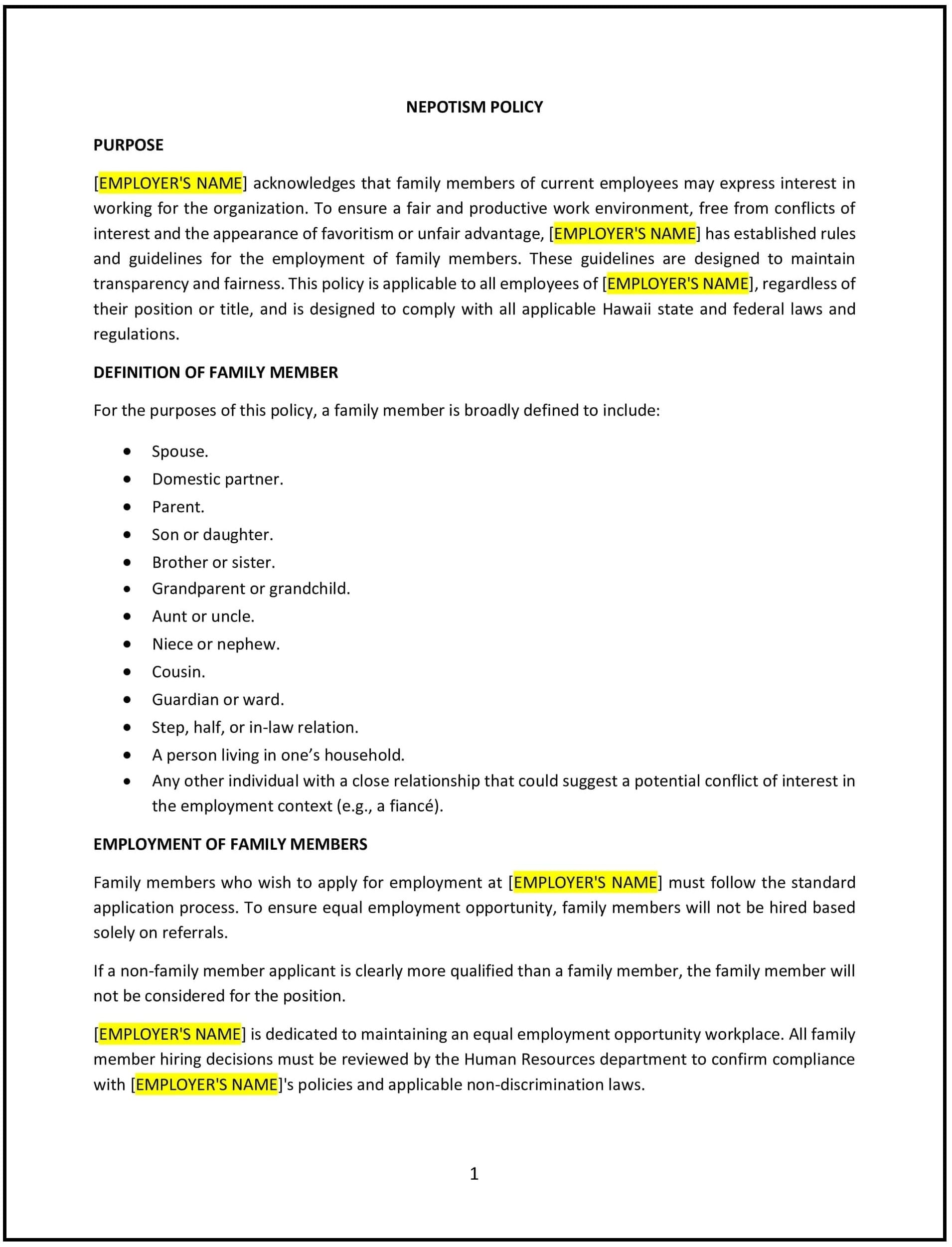Got contracts to review? While you're here for policies, let Cobrief make contract review effortless—start your free review now.

Customize this template for free
Nepotism policy (Hawaiʻi)
A nepotism policy helps Hawaiʻi businesses establish guidelines for managing situations where family members or close personal relationships may influence hiring, promotions, or workplace decisions. This policy outlines procedures for addressing potential conflicts of interest, ensuring fairness, and maintaining transparency in employment practices. Tailored to Hawaiʻi’s unique cultural and business environment, this policy is designed to promote equity, prevent favoritism, and foster a professional workplace culture.
By implementing this policy, businesses in Hawaiʻi can reduce the risk of conflicts, enhance employee trust, and ensure that employment decisions are based on merit and qualifications.
How to use this nepotism policy (Hawaiʻi)
- Define nepotism: Clearly outline what constitutes nepotism, such as hiring, promoting, or supervising family members or close personal relationships.
- Establish disclosure requirements: Specify that employees must disclose any familial or close personal relationships with colleagues to their supervisor or HR department.
- Address conflicts of interest: Provide guidelines for managing situations where nepotism may create conflicts, such as recusal from decision-making or restructuring reporting lines.
- Set hiring and promotion standards: Clarify that all employment decisions must be based on merit, qualifications, and job performance, not personal relationships.
- Communicate the policy: Share the policy with employees during onboarding and through internal communications to ensure awareness and understanding.
- Train managers: Educate supervisors on how to identify and address potential nepotism, handle disclosures, and enforce the policy consistently.
- Monitor compliance: Regularly review hiring, promotion, and workplace practices to ensure adherence to the policy and address any issues promptly.
- Review and update the policy: Regularly assess the policy’s effectiveness and make adjustments as needed to reflect changes in workplace dynamics or business needs.
Benefits of using this nepotism policy (Hawaiʻi)
This policy offers several advantages for Hawaiʻi businesses:
- Promotes fairness: Clear guidelines ensure that employment decisions are based on merit and qualifications, not personal relationships.
- Reduces conflicts: A structured policy minimizes the risk of favoritism, bias, or conflicts of interest in the workplace.
- Enhances trust: Demonstrating a commitment to fairness and transparency fosters trust and confidence among employees.
- Supports accountability: Employees and managers understand their responsibilities for disclosing relationships and avoiding conflicts of interest.
- Aligns with legal standards: The policy helps businesses comply with Hawaiʻi state laws and federal regulations related to employment practices.
- Improves workplace culture: A fair and transparent approach to nepotism contributes to a positive and professional work environment.
- Builds reputation: A strong nepotism policy enhances the business’s reputation as a fair and ethical employer.
Tips for using this nepotism policy (Hawaiʻi)
- Communicate the policy effectively: Share the policy with employees during onboarding and through regular reminders, such as emails or training sessions.
- Provide training: Educate managers on how to identify and address potential nepotism, handle disclosures, and enforce the policy consistently.
- Be consistent: Apply the policy uniformly to all employees to avoid perceptions of bias or favoritism.
- Encourage reporting: Create a culture where employees feel comfortable disclosing relationships without fear of retaliation.
- Monitor compliance: Regularly review hiring, promotion, and workplace practices to ensure adherence to the policy and address any issues promptly.
- Be transparent: Clearly explain the policy’s purpose, benefits, and expectations to employees to build trust and cooperation.
- Review the policy periodically: Update the policy as needed to reflect changes in workplace dynamics or business needs.